BUILDING THE SOUTH JERSEY RESEARCH HUB OF THE FUTURE: STRATEGIC PATHWAYS FOR RESEARCH EXCELLENCE AND REGIONAL IMPACT



BUILDING THE SOUTH JERSEY RESEARCH HUB OF THE FUTURE: STRATEGIC PATHWAYS FOR RESEARCH EXCELLENCE AND REGIONAL IMPACT



Born in Philadelphia and educated at the University of Pennsylvania, Walter Rand was a proud resident of Camden, New Jersey where he built an outstanding career in public service in the City and the wider South Jersey region. He was deeply involved in civic activities, looking to better the lives of residents in Camden City, Camden County, and across the region. Elected to the Camden Board of Education in 1971, the New Jersey State Assembly in 1975, and the New Jersey State Senate in 1981, Walter Rand was the chief architect of New Jersey’s Transportation Trust Fund and the South Jersey Transportation Authority, two critical accomplishments in the growth and development of the State and Southern New Jersey in particular. He also was instrumental in launching the Waterfront development that brought the State Aquarium and the E-Centre Amphitheater – now the Freedom Mortgage Pavilion – to Camden. He graduated summa cum laude from the University of Pennsylvania.
Senator Rand’s dedication to providing public support for transportation infrastructure was built on his conviction that the welfare of citizens and municipalities depends on regional development. In the same vein, he understood that higher education provides a powerful regional resource and he fought effectively to support Rutgers University’s Camden campus. In recognition of his devotion to Camden, South Jersey communities, and public service, Rutgers University established the Senator Walter Rand Institute for Public Affairs.


Launched in 2000, the Senator Walter Rand Institute for Public Affairs (WRI) was established under the leadership of its first director, Dr. Richard Harris, to honor Senator Walter Rand’s legacy of public service to Southern New Jersey and to his hometown of Camden. Just as Senator Walter Rand promoted a tireless search for facts and analysis that shape policy–all while maintaining a commitment to interact with his constitutents–WRI strives to provide communityfocused research and connect it to the public policy and practice issues in South Jersey. WRI upholds a strong commitment to bringing community and leadership together to make connections across research, policy, and practice in the region.

I am thrilled to share the Walter Rand Institute’s (WRI) 5-year strategic plan with you. Over the last 25 years, WRI has solidified its place as a premier research center focusing on important issues that impact South Jersey. From transportation and the opioid epidemic, to education, social services delivery, and public health, WRI continues to provide timely and impactful community-facing research that serves the public across the region.
As outlined in this strategic plan, we will continue to build upon an already strong foundation over the next five years and take WRI’s research, along with its strong community partnerships, to new heights. Our goals are to enhance our research portfolio, foster deep and wide public engagement—especially among local and State legislators, agencies, and community organizations—and launch exciting and dynamic opportunities for students, faculty, and other university stakeholders to engage in community-facing research that supports South Jersey.
The three-pronged teaching, training, and service mission of Rutgers–Camden is at the very heart of WRI’s strategic plan. In implementing our strategic priorities, we strengthen the university’s commitment to community engagement in our home city of Camden and across the eight counties that make up the Southern New Jersey region. Many of you will be collaborators in realizing the promise of this plan, and I look forward to deepening existing partnerships and forging new ones to make that happen. I would like to also thank university leadership, faculty, students, the WRI Advisory Board, and former WRI Directors Sarah Allred, Richard Harris, and Gwendolyn Harris for the time taken to review and provide input into this plan.
Senator Walter Rand would be immensely proud of what the Institute has become and what it will be in the future. I am excited about what the next five years have in store for the Walter Rand Institute for Public Affairs, and we look forward to collaborating with you to make it happen.

Mavis Asiedu-Frimpong DIRECTOR
SENATOR WALTER RAND INSTITUTE FOR PUBLIC AFFAIRS
RUTGERS UNIVERSITY–CAMDEN

Thank you for taking the time to learn more about the five-year strategic plan of the Walter Rand Institute at Rutgers University–Camden. Over the past quarter century, WRI has been a constant asset to our university, shepherding transformative research, interdisciplinary collaboration, and community engagement. WRI has made particularly important strides in public health, education, and securing a bright economic future for all South Jerseyans. The 2024-2028 Strategic Plan promises more innovation and success in those areas and many others; I am excited by the ways it complements and contributes to the Rutgers–Camden 2023-2028 Strategic Plan.
Our community is fortunate to have WRI as a staunch advocate for evidence-based, equitable solutions to South Jersey’s challenges. The Institute’s researchers prove that academic inquiry need not and should not be confined to the ivory tower; WRI research has conferred direct benefit to our community. This impact stretches beyond Camden County and into all eight counties that comprise our region. WRI exemplifies what it means to be a community-engaged institution, providing a model of real-world impact for students and faculty in public affairs and all the university’s academic disciplines.
The Institute’s strategic engagement of the Camden community and our student population is essential to Rutgers–Camden’s mission and vision. Our university consistently ranks among the top 30 nationwide in community engagement; the WRI has played a substantial role in helping us achieve this distinction and is critical to our plans to rise even higher. Rutgers–Camden is also committed to involving our students deeply in research projects as part of a holistic student experience. The dozens of students the WRI has engaged in world-class research—with total funding reaching into eight digits—have no doubt had their lives changed for the better through their involvement.
I look forward to another five years of success at the Walter Rand Institute under its 2024-2028 strategic plan. I thank all those who have come together to set this bold vision for the future of the institute and for South Jersey.
Antonio D. Tillis, Ph.D. CHANCELLOR RUTGERS UNIVERSITY–CAMDEN
The Senator Walter Rand Institute for Public Affairs at Rutgers–Camden (WRI) plays a very special role in our region and State. Southern New Jersey is a wonderful place to live and work, and we are proud to serve as Board Members for an entity devoted to exploring both challenges and opportunities in making our region the best it can possibly be through robust and rigorous research and evaluation across a variety of priority areas, including transportation, food security, the opioid epidemic, education, and workforce development. Research into the social issues that impact all South Jerseyans is critical for developing sound public policy and practice, and WRI fills that role in our region.
In developing this strategic plan, the WRI Advisory Board provided strong input into the Institute’s future direction and the activities that would achieve the goals outlined. The Advisory Board is made up of a diverse set of influential leaders across the public, private, and non-profit sectors, each with a love for and commitment to South Jersey. Taken together, this plan provides a roadmap toward a stronger region, and it is exciting to release it to the public and WRI’s supporters and collaborators.
WRI forms part of Rutgers University-Camden, and connecting the university to regional issues is another critical part of the Institute’s mission. We also take its role as student learning hub seriously, and we aim to support Rutgers by engaging more students than ever before to ensure that they enter the workforce with an understanding of Southern New Jersey and the research skills to be able to change the world.
On behalf of WRI’s Advisory Board, we support and endorse the strategic goals and activities within this plan and look forward to collaborating with the Institute to make them a reality.
Michael Egenton
EXECUTIVE
VICE PRESIDENT
NJ STATE CHAMBER OF COMMERCE
CHAIR - ADVISORY BOARD
SENATOR WALTER RAND INSTITUTE FOR PUBLIC AFFAIRS
Amy Osborn
CHIEF EXECUTIVE OFFICER
NEW JERSEY VIETNAM VETERANS’ MEMORIAL FOUNDATION
VICE CHAIR - ADVISORY BOARD
SENATOR WALTER RAND INSTITUTE FOR PUBLIC AFFAIRS
The Senator Walter Rand Institute for Public Affairs (WRI) at Rutgers–Camden has been a long-standing and trusted regional community partner for over 20 years. WRI honors former Senator Rand’s dedication to Southern New Jersey and exists to produce and highlight community-focused research and evaluation leading to sound public policy and practice in the region. With that as a foundation, WRI convenes and engages stakeholders in making the connections across research, policy, and practice in support of Camden City and Southern New Jersey residents. Using social science research methods, WRI specializes in transforming data into actionable information across a variety of areas, including workforce development, education, transportation, and public/population health. WRI reinforces and amplifies Rutgers’ research, teaching, and service goals by connecting the multidisciplinary expertise of faculty to regional problems, developing research and professional skills in students, and linking the resources of higher education to communities in Southern New Jersey.

WRI reinforces and amplifies Rutgers service, teaching, and training goals by:
● Conducting multidisciplinary communityfocused research and evaluation that connect to public policy and practice issues in Camden City and across Southern New Jersey. We view community-focused research as aiming to answer questions about social and economic programs, issues, environments, and conditions that directly affect the region’s local communities and residents.
The Walter Rand Institute is:
● Responsive to the needs of Camden City and Southern New Jersey communities. WRI has its pulse on the issues of concern and areas of opportunity, improvement, and growth for Southern Jersey residents and conducts timely research that amplifies and highlights them.
● Flexible, nimble, and creative in research methodology and in meeting the research needs and goals of both the community and the university.
● Committed and connected to Southern New Jersey. WRI has a deep understanding of the region, is dedicated to serving Southern New Jersey communities, and builds strong collaborative research partnerships with government agencies, legislators, and community organizations across the region to realize its mission.
● Convening stakeholders to make connections across research, policy, and practice in support of Southern New Jerseyans.
● Connecting the multidisciplinary expertise of university faculty to regional problems.
● Training and mentoring students from across disciplines in community-focused research.
● A critical resource for reliable information, data, and research for government agencies, legislators, faculty, the university, community providers, and residents about Southern New Jersey.
● Committed to Equity. WRI strives to both understand and reflect on the impact of its collaborative research on realizing a healthy, thriving, and equitable Southern New Jersey and employs research designs and methodologies that integrate diverse perspectives and promote inclusivity
The Walter Rand Institute’s strategic planning process began in spring 2022. Through extensive discussions, interviews, and prioritization exercises with WRI staff, the WRI Advisory Board, university leadership, faculty, and students, WRI developed the following vision and strategic priorities.
Through this strategic plan, the Senator Walter Rand Institute for Public Affairs deepens its commitment to South Jersey, increases its capacity to conduct impactful research, and expands its reach to new audiences.
The Senator Walter Rand Institute is the primary goto resource for communityfocused research that influences policy and practice across Southern New Jersey. At WRI, we view the community broadly: residents, businesses, service delivery providers, educational institutions— anyone who lives, works, goes to school, and/or does business in South Jersey.


THIS PLAN ALSO ALIGNS WITH THE BROADER RUTGERS UNIVERSITYCAMDEN FIVE-YEAR STRATEGIC PLAN
RELEASED IN FALL 2023 :
1. Research Portfolio Development
Enhancing WRI’s community-facing research portfolio to produce timely policy and practicerelevant research that highlight issues and solutions across Southern New Jersey.
2. Linking the University to Regional Issues
Creating dynamic pathways for faculty and the university to both engage in impactful South Jerseybased research and offer coursework in communityfocused research.
3. Strategic Public Engagement
Fostering a variety of research engagement opportunities for government officials, State and local agencies, community providers and members of the public that effectively support Camden City and all Southern New Jersey counties in sound policy and practice decision-making.
4. Student Engagement
Expand an already robust set of offerings to create a learning laboratory for students that teaches and trains the next generation of professionals and leaders in community-facing research practices, writing for public audiences, and furthers students’ professional research goals and interests.
• WRI’s focus on research that supports the surrounding South Jersey community and fosters relationships within the region reflects the Beloved Camden Community pillar of the University’s strategic plan;
• Creating powerful experiential learning experiences and unique research opportunities for students that prepare them for the next step in their careers connects with the Transformative Student Success and Innovation in Academic Excellence pillars of the University’s strategic plan
LEARN MORE ABOUT RUTGERS–CAMDEN’S STRATEGIC PLAN
Strategic Priority 1

Enhancing WRI’s communityfacing research portfolio to produce timely research that highlight issues and solutions across Southern New Jersey


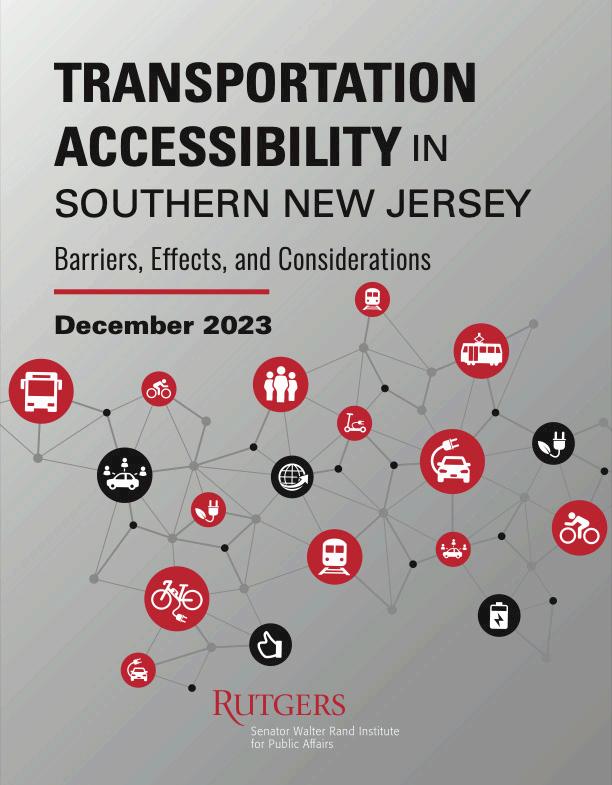

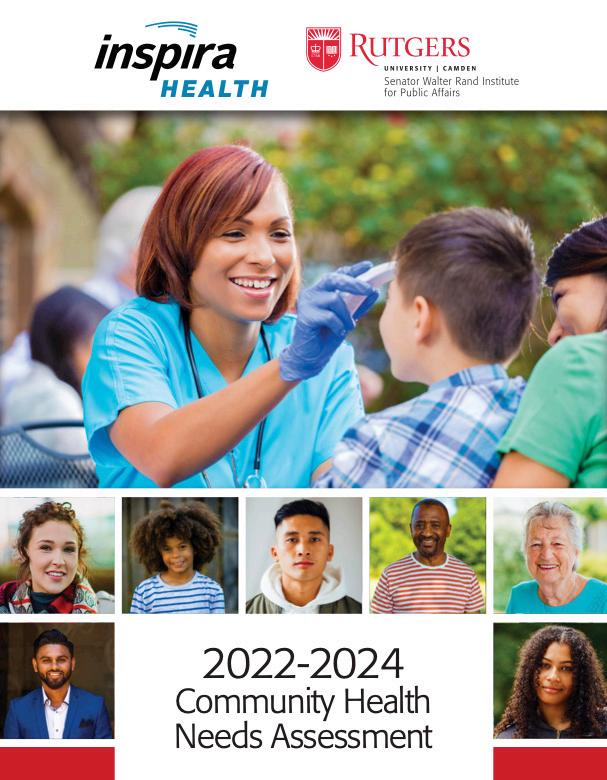
I do not know where I would be if I did not have the connections with the Walter Rand Institute. A town such as Bridgeton, we can not afford the staffing necessary to do a lot of the research and that’s needed to investigate possibilities and ideas or programs.
—HON. ALBERT KELLY MAYOR, CITY OF BRIDGETON, WALTER RAND INSTITUTE ADVISORY BOARD MEMBER
Southern New Jersey and its eight counties—Atlantic, Burlington, Camden, Cape May, Cumberland, Gloucester, Ocean, and Salem— are incredibly diverse in population, environment, and terrain. From Atlantic to Camden City, rural areas to coastal shore, Southern New Jersey has so much to offer everyone who calls it home. There is much opportunity across the region, but it is not without challenges—South Jersey counties consistently fall to the bottom half of health rankings across the State, which speaks to a variety of community issues across the region, including housing, transportation, employment, public health, food insecurity, and education. The Senator Walter Rand Institute for Public Affairs exists to serve Rutgers University, the region, and State, by bringing social and community issues and solutions in the Southern New Jersey region to the forefront with trusted data and research that supports sound decision-making in policy and practice that can impact those outcomes.
Over the last 25 years, the Institute has built deep and strong research partnerships with community organizations, State and local agencies, and providers across the region to answer important research questions. WRI’s focus areas are South Jersey’s focus areas, and we strive to be responsive to whatever the community issues of the day may be.
This strategic plan has WRI building on this strong foundation by ensuring that our research portfolio is laser-focused on the issues that are top of mind for Camden City and South Jerseyans on the whole, establishing deep research partnerships, and supporting organizations in making data-driven decisions.
The research conducted was instrumental in testing out the viability of a key strategy area. WRI’s partnership, on-the-ground research, community engagement and data analyses, to name a few, moved a theory into the realm of actionable steps that could be built upon.
—WRI RESEARCH PARTNER
Drive WRI’s overall research agenda based on top public policy and practice issues within the region – such as State and local legislative priorities, community needs assessments, and data that highlights pockets of need within South Jersey. Additionally, ensure that the research portfolio spans across Southern New Jersey’s eight counties and incorporates a wide range of content areas reflecting the region’s needs.
Establish additional long term formal research collaborations with organizations and government entities that reflect the top of mind needs of South Jersey communities.
Explore the possibility of establishing a research response fund that supports urgent research needs for legislative bodies, agencies, and community providers across the region.
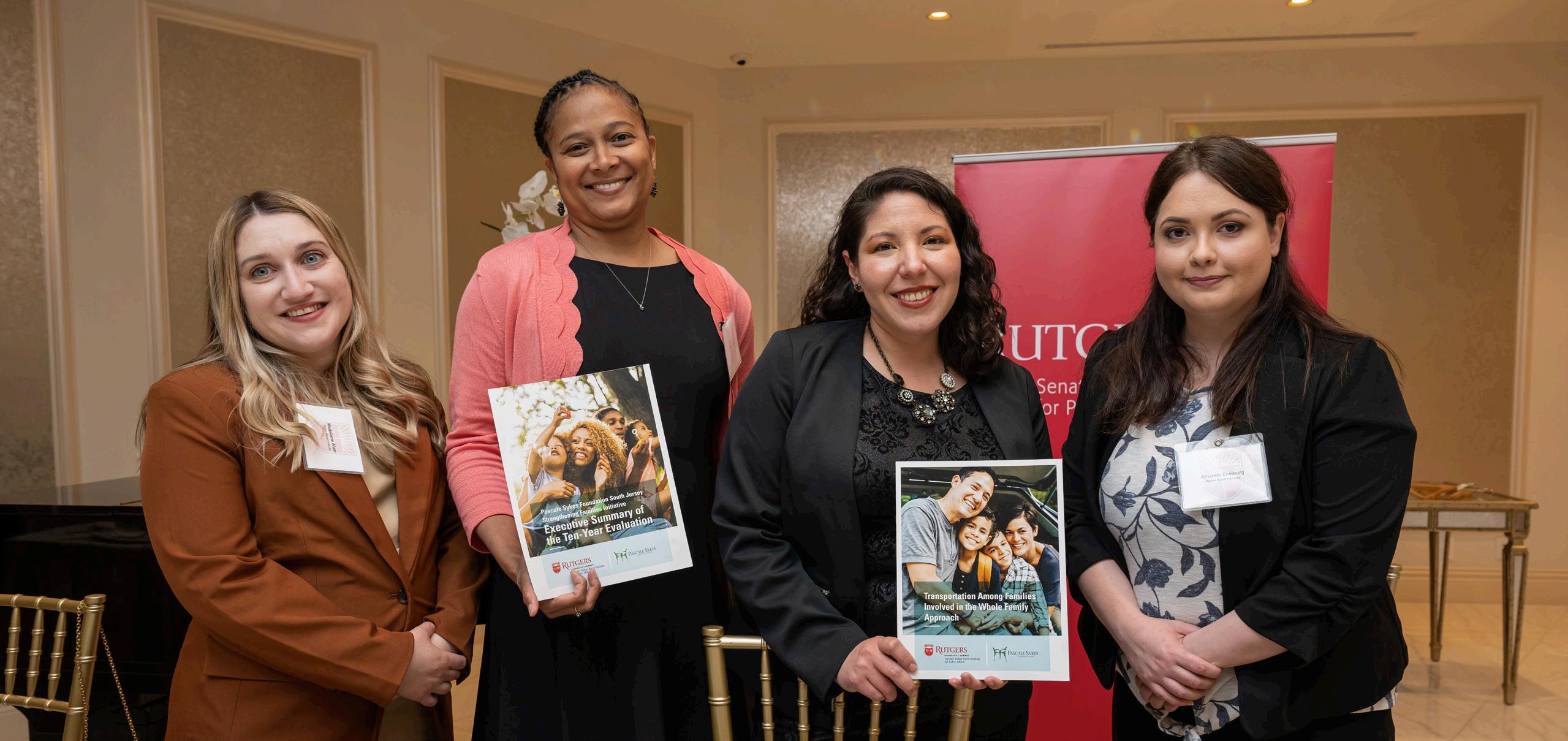
Strategic Activity 4.
Support local organizations across the region in understanding, translating, and interpreting the data they collect to improve service delivery operations. Similarly, increase capacity to provide organizational project and program evaluation support for local entities.
Strategic Activity 5.
Build upon WRI’s research, data collection, and analysis strategies to further incorporate community-based participatory research principles and methodologies and equity-forward approaches and dissemination efforts.
Strategic Activity 6.
Given the university’s Camden City location, commit to having at least one research project at all times that focuses on Camden City and its residents.
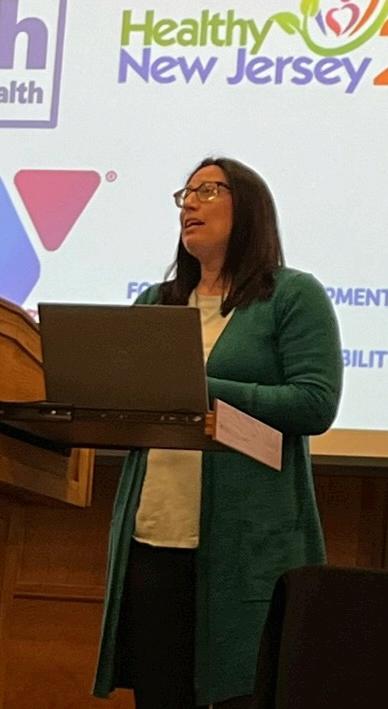
WRI’s history is filled with accomplishments that have benefited the people of South Jersey. They have played a critical role in conducting research and analyzing data on barriers to healthcare access, which then drive development of the public policy solutions we need in South Jersey.
—BRIANNA DONAHUE, INSPIRA HEALTH AND WRI ADVISORY BOARD MEMBER
Strategic Priority 2

Creating dynamic pathways for faculty and the university to both engage in impactful South Jersey-based research and offer coursework in communityfocused research
Rutgers University–Camden strives to be of service to the surrounding South Jersey communities. Fostering a community-engaged campus is a top priority for the Camden campus and Rutgers University as a whole. The Senator Walter Rand Institute for Public Affairs is critical to the university’s goal since through its own research, WRI links the university directly to regional issues.
Over the next five years, the Institute will take that a step further by establishing short and long-term South Jersey-based research opportunities for faculty and other researchers across the campus, as well as creating and delivering coursework that educates students about the surrounding South Jersey community and the importance of community-facing research.
Re-establish fellowships that support faculty and other university researchers in pursuing research that benefits the region. Explore the possibility of formal WRI faculty affiliations that provide mutually beneficial learning for faculty and WRI staff, cross-pollination of ideas, and research support and promotion.
Explore a role for WRI in supporting faculty and other university researchers in connecting their professional research to the Southern New Jersey context and translating that research for public/ community audiences.
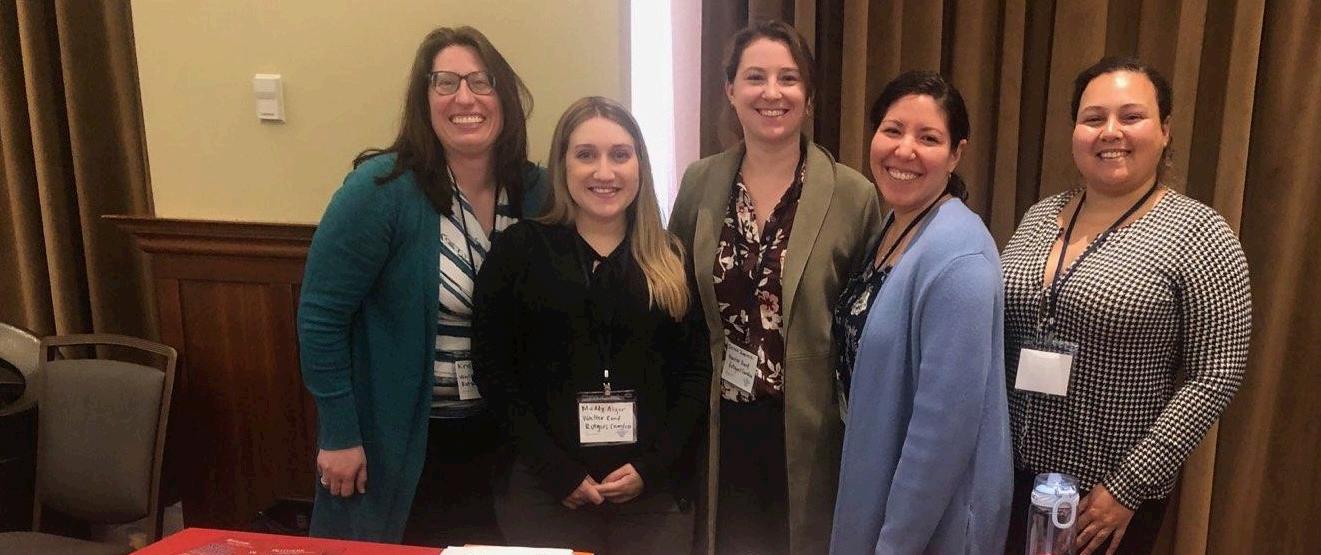
Strategic Activity 3.
Make WRI data sets available for faculty and other university researchers to further analyze and answer research questions of interest to South Jersey, and for use in their courses to support experiential learning objectives.
Strategic Activity 4.
Develop and regularly deliver academic coursework and certifications at Rutgers University–Camden that provide the South Jersey context and highlight the connections between community-facing research, policy, and practice.
Strategic Activity 5.
Create formal partnerships with faculty, university institutions, and centers to conduct collaborative research and deliver programs and events (e.g. conferences, webinars, seminars, lectures) at Rutgers–Camden.

What we value most and appreciate about the team from WRI is their professionalism, great communication, and their willingness to problem solve with us. We appreciate their ability to apply quality research and evaluation to social problems, and their ability to use qualitative assessment to improve the effectiveness of programming. The staff is extremely flexible in working with us and our clients to make connections and conduct their research, while understanding and navigating the complexities of our clients’ situations.
—RICH NICHOLS AND RACHAEL BILL, UNITED ADVOCACY GROUP
Strategic Priority 3

Fostering a variety of research engagement opportunities for government officials, State and local agencies, community providers and members of the public to effectively support sound policy and practice decision-making across the region
WRI partners with State and local government agencies, legislators, faculty, and community organizations to conduct community-based research and evaluations that support the shared goal of a healthy, thriving South Jersey. From transportation and education, to the opioid epidemic, transportation, food insecurity, and housing, WRI works hand in hand with partners to answer pressing questions about social issues, forging strong academic-community partnerships that seek to improve lives and strengthen communities across the region.
WRI’s public engagement activities aim to raise the visibility of WRI and Rutgers University–Camden as an anchor institution for the intersection between community-focused research, policy, and practice in the region. There are many research questions in the community that need answers, and WRI has a responsibility to support and facilitate this not only through its own research, but by also building the capacity of community partners to engage in research within their own institutions.
Organize in-person, virtual and hybrid public convenings, conferences, seminars, and/or legislative briefings to share WRI research findings and spur impactful, data-driven discussion and action around them that support the region.
Establish workshops, training, coaching, and support programs around data collection practices, project evaluation, and data analysis techniques for community partners across the region.

Strategic Activity 3.
Promote the value of qualitative research in decision-making. This could include creation of a public-facing repository for WRI’s qualitative research data across content areas and connect it to existing quantitative data, i.e. data sets that highlight community voice.
Strategic Activity 4.
Explore possibility of a South-Jersey event connecting researchers at regional universities to community partners to facilitate partnerships and plan for meeting community research needs.
Strategic Activity 5.
Plan and execute Walter Rand Institute’s 25th anniversary event.
Strategic Activity 6.
Triple the amount of public-facing written content that WRI produces per year. This includes reports, briefs, and white papers.
Strategic Activity 7.
Launch and maintain the WRImpact blog that regularly highlights and contextualizes research findings and provides WRI insights.
Strategic Activity 8.
Explore the possibility of conducting regular public listening sessions across South Jersey to further amplify community voice.
South Jersey is incredibly fortunate to have Rutgers–Camden as a premier research university here in our State. So the Rand Institute and its partnership with Rutgers–Camden exemplifies what the connection between higher education and the public should be. When you think about how public policy is devised and the ability to have a think tank like the Rand Institute to partner with such a premier institution as Rutgers–Camden, we have the best of both worlds and those of us who rely on that good counsel help shape the policy that affects all of our lives.”
–TROY SINGLETON, SENATOR, 7TH LEGISLATIVE DISTRICT, NEW JERSEY

Expand an already robust set of offerings to create a learning laboratory for students that teaches and trains the next generation of professionals and leaders in community-facing research practices, writing for public audiences, and furthers students’ professional research goals and interests.
As a teaching, training, and experiential learning hub for community-facing research, engaging students at Rutgers–Camden is a key tenet of WRI’s work. WRI works directly with students on research projects, supports the research interests of students through scholarships and fellowships, and provides opportunities for students to produce impactful written materials for public audiences across the region and State. Our goal is to provide exciting experiences that make students competitive when they enter the workforce and equip them with the tools needed for understanding the role of community-based research in making policy and practice decisions in whatever career they find themselves.
Over the next five years, WRI will increase its capacity to support student-led research and professional development and establish new programs that facilitate student connectivity with South Jersey organizations.
Strategic Activity 1.
Double the number of student research fellowships and scholarships offered, with special attention to students within existing Rutgers need-based programs, such as the Educational Opportunity Fund and TRiO Support Services.
Strategic Activity 2.
Launch the WRI Public Engagement Writing Seminar—a program that teaches and trains students in community-facing research and translating research for public audiences. Partner with faculty and other university staff in delivering content and workshops within the program.
Strategic Activity 3.
Create opportunities for students to engage in independent study research projects at the Institute.
Strategic Activity 4.
Develop and deliver WRI staff-led community-facing research courses across the university that provide students with academic course credit.
The Institute is a teaching, living body that [not only] adds and helps cultivate students, but allows the students to look at real life practical problems, research them, and get them ready to go out into the real world.
—JUDGE CHARLES
RAND NJ SUPERIOR COURT (RETIRED), WALTER RAND INSTITUTE
ADVISORY BOARD MEMBER
Working for WRI is great because I get to be part of truly meaningful work taking place in my home state. [It] provides me with practical, on the job learning opportunities, as well as a better sense of what my future career path could look like.”
—WRI STUDENT RESEARCHER
Strategic Activity 5.
Establish a program that embeds students in local community provider organizations to provide customized research and data analysis support.
Strategic Activity 6.
Establish WRI Student Alumni network and potential formal mentoring program for current and former students who have worked with WRI.
Strategic Activity 7.
Launch student conference fund to support students in networking, presenting their own research, and/or learning new skills.

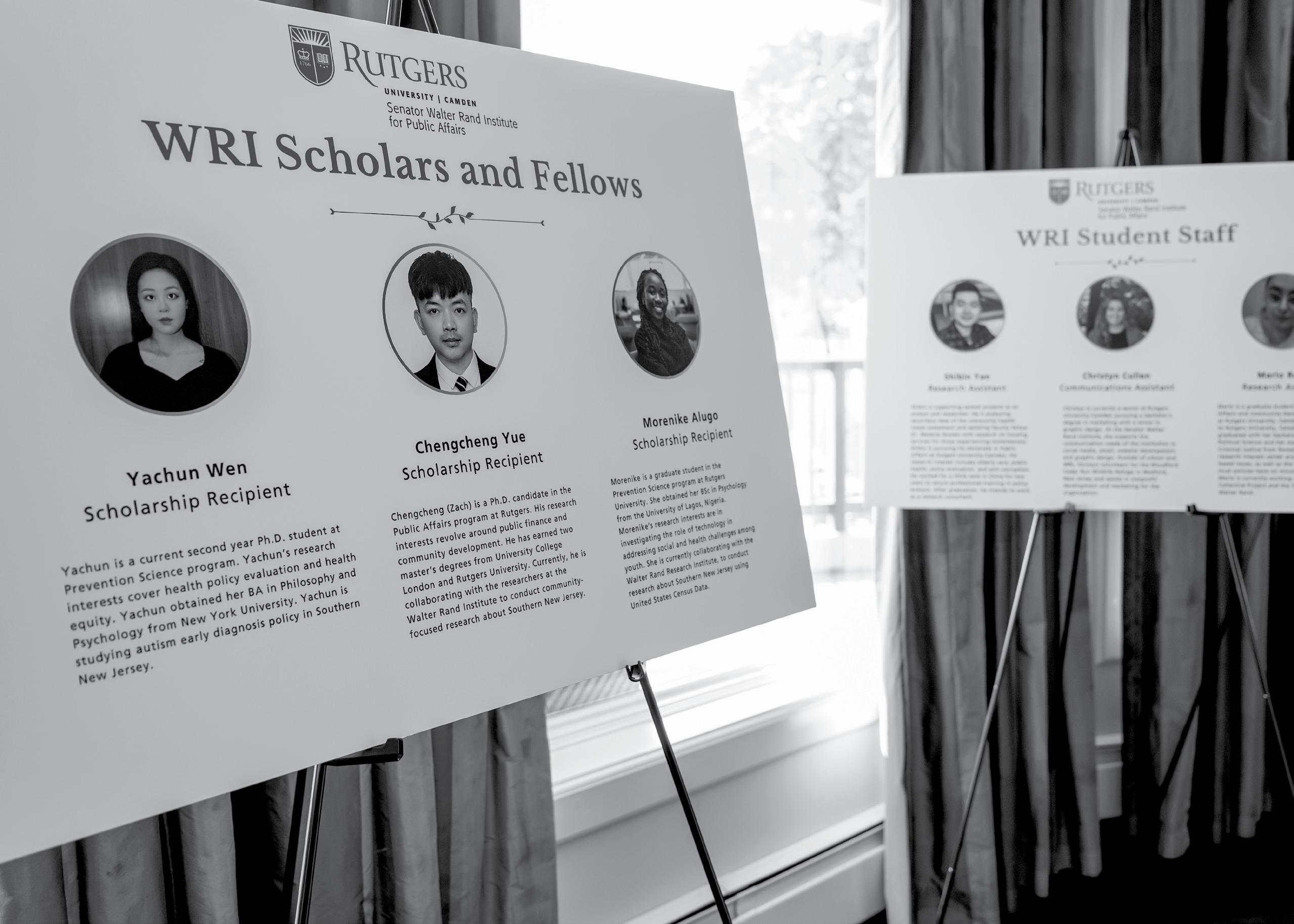
My time with WRI has been a unique and incredible journey thus far. Every day, I am challenged by my fellow peers to produce the most exceptional work in service to the South Jersey community. The research skills, relationships, professional development, and leadership opportunities provided by WRI distinguish its students from other individuals.”
—WRI STUDENT RESEARCHER
Mavis Asiedu-Frimpong, J.D., MPH DIRECTOR
Kristin Curtis, M.A.
ASSOCIATE DIRECTOR OF RESEARCH
Celine Thompson, Ph.D.
SENIOR EDUCATION PROJECT ADMINISTRATOR
Devon Ziminski, M.S.
SENIOR RESEARCH PROJECT ADMINISTRATOR
Madeliene Alger, M.A.
RESEARCH PROJECT COORDINATOR I
Amanda Ekelburg, M.A.
RESEARCH PROJECT COORDINATOR II
Kiersten Westley Henson, M.A., M.S. RESEARCH PROJECT COORDINATOR I
Suyeon Noh, Ph.D.
SENIOR PROJECT ADMINIST RATORCLAY TON MODEL EVALUATION
Natalie Passov, M.C.M.
SENIOR PUBLIC RELATIONS SPECIALIST – COMMUNICATIONS AND PUBLIC ENGAGEMENT
Carla Villacis, M.A. RESEARCH PROJECT COORDINATOR I
Jacqulyn Lehrian, M.P.A.
DEPARTMENT ADMINIST RATOR
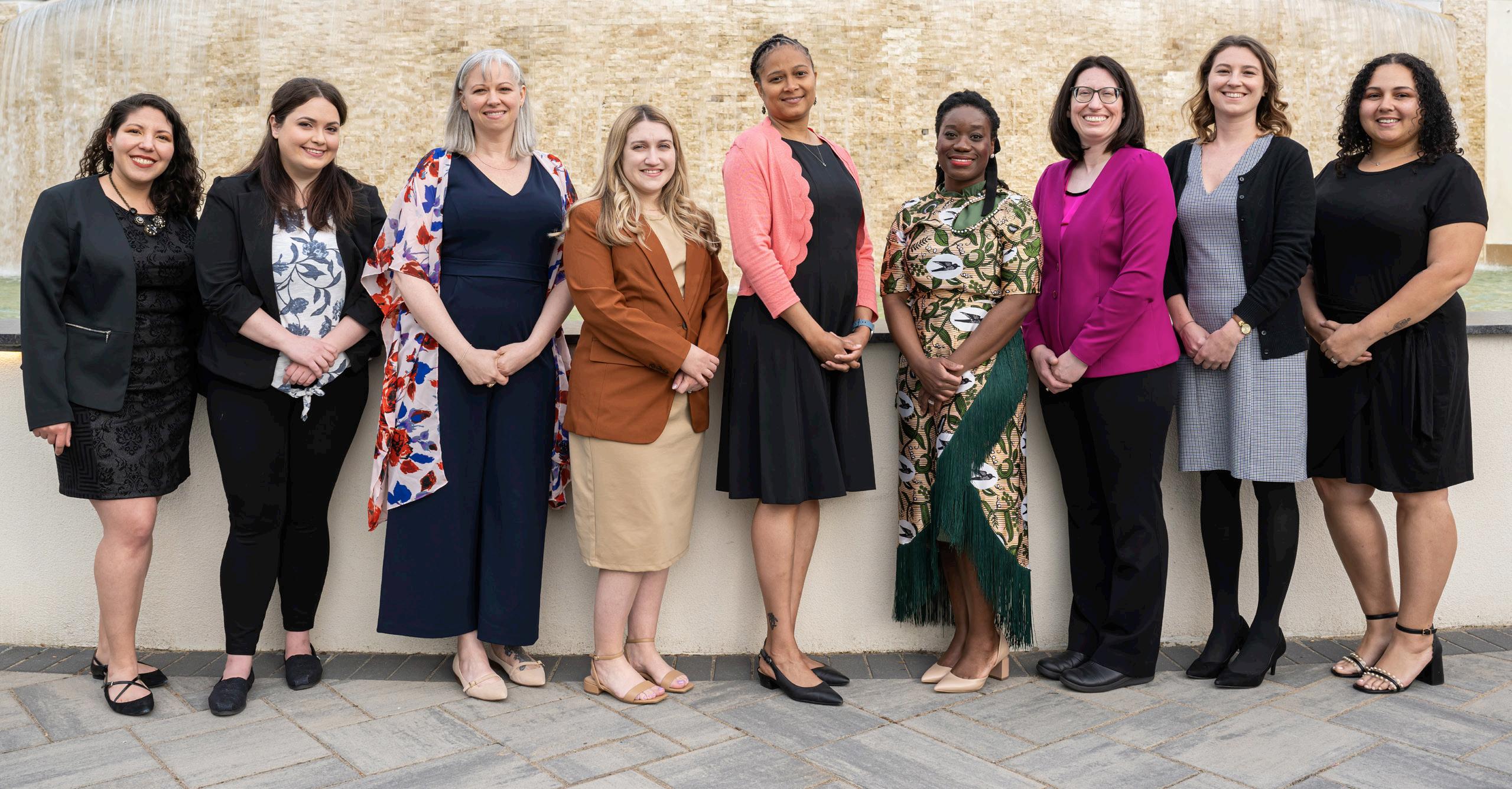
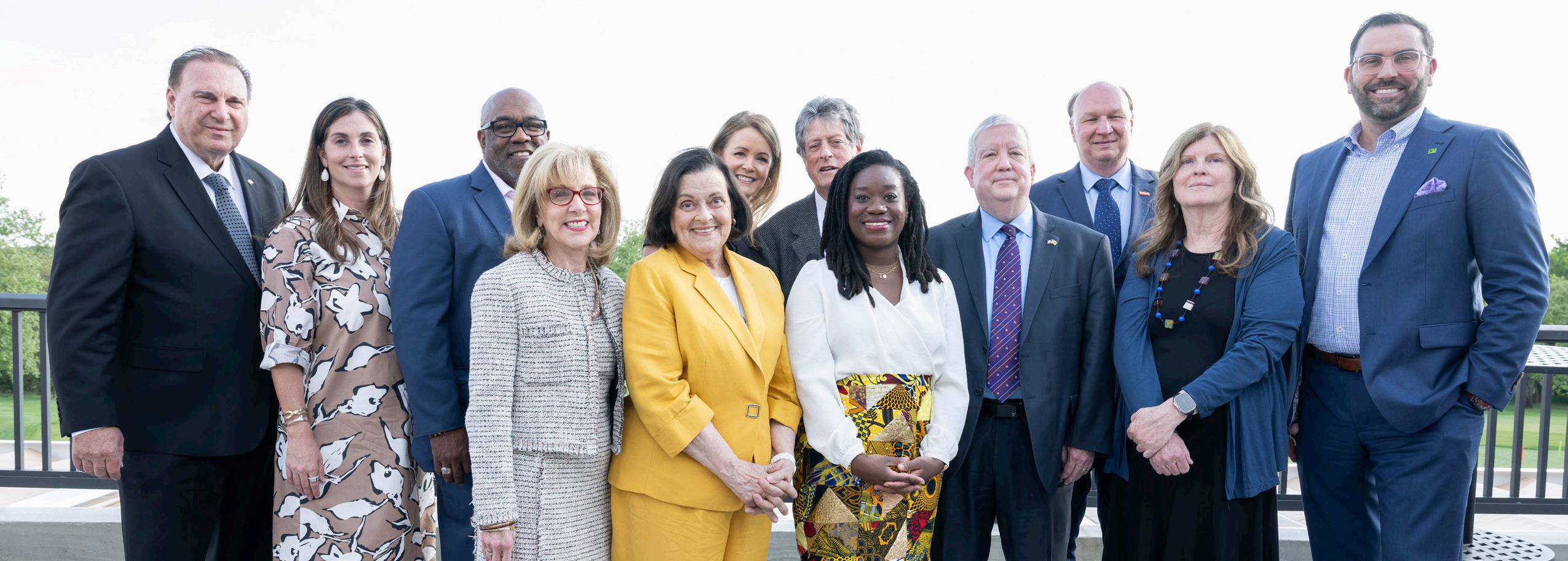
Michael Egenton – Chair NEW JERSEY STATE CHAMBER OF COMMERCE
Amy Osborn – Vice Chair NEW JERSEY VIETNAM VETERANS’ MEMORIAL FOUNDATION
Megan Griffault AAK US
Ian Leonard IBEW
Christina Renna CHAMBER OF COMMERCE SOUTHERN NEW JERSEY
Hon. Nicholas Asselta ASSELTA STRATEGIES
Dennis Culnan Jr. STEVENS & LEE PUBLIC AFFAIRS
Michael Chait GREATER ATLANTIC CITY CHAMBER
Brianna Donahue INSPIRA HEALTH
Samuel L. Donelson AECOM
Hon. Patricia Egan Jones FORMER NJ ASSEMBLY, DISTRICT 5
Daniel Foley LOCKTON COMPANIES
Kevin Gibala TD BANK
Hon. Albert Kelly MAYOR, CITY OF BRIDGETON
Jennifer Lehman CAMPBELL SOUP
Jane Massey Licata, Esq. LICATA & TYRRELL
Daniel Lombardo VOLUNTEERS OF AMERICA DELAWARE VALLEY, INC.
Hon. Charles Rand
NEW JERSEY SUPERIOR COURT (RETIRED)
Michael Wallace ATLANTIC CITY ELECTRIC
Hon. Jonathan Young COMMISSIONER, CAMDEN COUNTY
THERE
Visit https://rand.camden.rutgers.edu/donate/ to learn more.
CONTACT
Senator Walter Rand Institute for Public Affairs
Rutgers University–Camden 411 Cooper Street Camden, NJ 08102 (856) 225-6566
wrand@camden.rutgers.edu